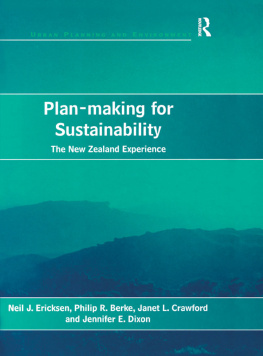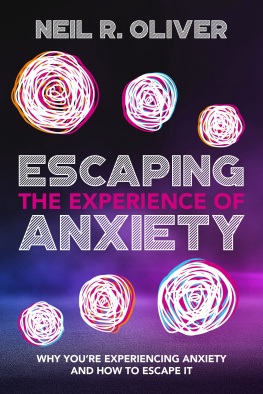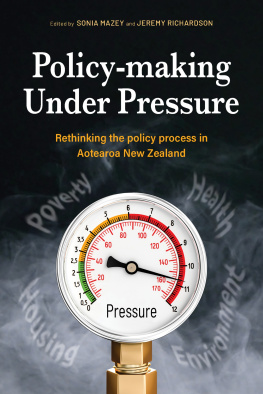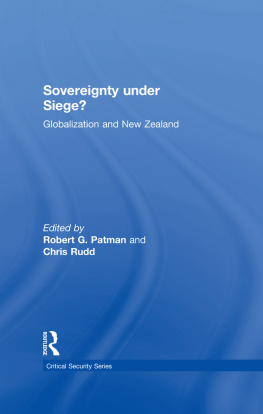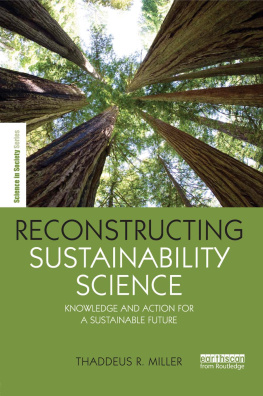PLAN-MAKING FOR SUSTAINABILITY
Plan-making for Sustainability
The New Zealand Experience
NEIL J. ERICKSEN
University of Waikato
PHILIP R. BERKE
University of North Carolina
JANET L. CRAWFORD
Planning Consultants Ltd, Auckland
JENNIFER E. DIXON
University of Auckland
First published 2004 by Ashgate Publishing
Published 2017 by Routledge
2 Park Square, Milton Park, Abingdon, Oxon, OX14 4RN
711 Third Avenue, New York, NY 10017, USA
Routledge is an imprint of the Taylor & Francis Group, an informa business
Copyright Neil J. Ericksen, Philip R. Berke, Janet L. Crawford and Jennifer E. Dixon 2004
Neil J. Ericksen, Philip R. Berke, Janet L. Crawford and Jennifer E. Dixon have asserted their right under the Copyright, Designs and Patents Act, 1988, to be identified as the authors of this work.
All rights reserved. No part of this book may be reprinted or reproduced or utilised in any form or by any electronic, mechanical, or other means, now known or hereafter invented, including photocopying and recording, or in any information storage or retrieval system, without permission in writing from the publishers.
Notice:
Product or corporate names may be trademarks or registered trademarks, and are used only for identification and explanation without intent to infringe.
British Library Cataloguing in Publication Data
Plan-making for sustainability : the New Zealand
experience. - (Urban planning and environment)
1.Environmental policy - New Zealand 2.Environmental policy - New Zealand - Case studies 3.Sustainable development -Government policy - New Zealand 4.Sustainable development -Government policy - New Zealand - Case studies 5.City planning - Environmental aspects - New Zealand 6.City planning - Environmental aspects - New Zealand - Case studies
I.Ericksen, Neil J.
333.770993
Library of Congress Cataloging-in-Publication Data
Plan-making for sustainability : the New Zealand experience / Neil Ericksen [et al.].
p. cm. -- (Urban planning and environment)
Includes bibliographical references and index.
ISBN 0-7546-4066-3
1. Environmental policy--New Zealand. 2. Environmental management--New Zealand. 3. Sustainable development--New Zealand. I.Ericksen, Neil J. II. Series.
GE190.N45P56 2004
363.700993--dc22
2003062015
ISBN 13: 978-0-7546-4066-0 (hbk)
Contents
Neil J. Ericksen is Professor and founding Director of the International Global Change Institute at The University of Waikato, Hamilton, New Zealand. His research interests are in evaluating development of national policies for managing resources, hazards, and environment and factors influencing their translation into practice by local government. He is author and co-author of several books and monographs in this general field of planning and governance, and has particular expertise in human response to natural hazards.
Philip R. Berke is a Professor in Land Use and Environmental Planning in the Department of City and Regional Planning at the University of North Carolina, Chapel Hill, USA. He was a Senior Fulbright Research Scholar at the International Global Change Institute, New Zealand in 1993, and is a Research Fellow at the Lincoln Institute of Land Policy, Cambridge, Massachusetts. His recent research focuses on local planning and sustainable development, and the influence of compact urban forms on watersheds. He is co-author of several books and has contributed articles to a variety of environmental policy and planning journals, receiving the Best Article Award in 2000 by the American Planning Association. He is currently preparing the 5th Edition of Urban Land Use Planning (Philip Berke, Edward Kaiser, and David Godschalk, University of Illinois Press).
Janet L. Crawford is a practitioner and Director of Planning Consultants Ltd in Auckland, New Zealand. She has over 25 years of planning experience, first within local government and then as a consultant to both the public and private sectors. Her main interests are environmental conflict resolution, plan writing and plan implementation and she is an established teacher and trainer in these areas.
Jennifer E. Dixon is Professor and Head of Department of Planning, University of Auckland, New Zealand. Before taking up an academic position, she worked for several years as a practitioner. Her research interests are planning practice, environmental assessment, and urban intensification. She has contributed a number of articles and book chapters in these fields. She was formerly President of the New Zealand Planning Institute (199698).
Since the enactment of the Resource Management Act in 1991 the Parliamentary Commissioner for the Environment (PCE) has taken an active interest in its implementation. Through the mid 1990s a number of investigations focused on consultation processes, compliance with consents, the effects of side agreements (consent purchasing) and the management of such matters as amenity values and urban vegetation. More recently, the PCE has focused on whether or not the Act is enabling communities to achieve the desired environmental outcomes. All too frequently it is not, and the reasons often lie in the quality of the plans and the breadth and depth of understanding of what is really needed to improve environmental sustainability.
The RMA, as has been said many times, is an innovative piece of environmental legislation. However, it was introduced at a time when sustainability concepts were only just beginning, in the immediate post Bruntland phase, to enter the wider public policy discourse of the western world. This was a difficult context for a major paradigm shift, a new way of thinking about how we live within environmental limits (i.e. sustainably). Given the lack of understanding, and conflicting understandings, as to just what sustainability really means in the RMA context it is not surprising that communities the length and breadth of New Zealand are still struggling to develop and implement effective plans.
Plan-making for Sustainability: The New Zealand Experience by Neil Ericksen and his team makes a substantive contribution to our understanding of the quality of RMA plans. The research literature on plan making, and implementation, for sustainability is limited not just in New Zealand but also internationally. This is surprising given the magnitude of what is trying to be achieved through environmental plans and sustainability policy in general in many countries. Plan-making for Sustainability: The New Zealand Experience provides robust insights into why RMA plans have not lived up to expectations. The study puts a spotlight on the magnitude of the shift from an activities based planning system to an effects based one against a backdrop of market liberalization and restructuring of local government. In organizational terms, making such a large transition in planning approach, on a canvas of significant governance restructuring and societal changes, necessitates robust legislation, central government capacity building and investment in local capacity to create good plans.
Neil Ericksen and his team have provided evidence that these conditions were not met and provide suggestions for remedying them. In doing so, they are making an important contribution to global understanding of the effectiveness of different approaches to environmental policy making. The work joins that of recent seminal studies such as


